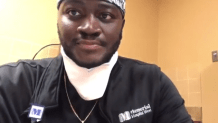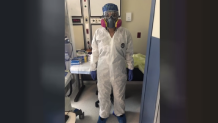Lucadet “Luc” Vedrine describes himself as a “man of the book” but he says these past months have tested his limits.
“Until my time comes, I’m protected and I just hope this (pandemic) will be gone, that this will leave us,” Vedrine told NBC 6 after finishing another hectic day in the intensive care unit at Memorial Hospital West in Pembroke Pines.

Vedrine, a critical care nurse, begins his shift at 6:45 a.m. and leaves around 8 p.m. these days.
“Nurses don’t need much to stay awake, especially during the day shift. Our patients are pretty critical so we need to be on our toes,” he said while documenting his shift with his cellphone.
Vedrine told us COVID-19 positive patients are in six units at the hospital. He spends his time monitoring them and trying to wean them off of oxygen over time as they recover. It’s a delicate balance for patients close to going over.
“I take all the steps that I possibly can. That’s why I’m in prayer. That’s all I can do on my side and I leave the rest to God because I have to treat my patients,” Vedrine said.
Local
Nearly the entire time, he wears a full set of personal protective equipment: gowns, gloves, masks and face-shields. He describes it as a hot sauna.
“Whatever shape or form, they (N95 masks) leave these lines,” he said showing the marks left by a mask on his face.

As many frontline workers, Vedrine worries about bringing the virus home to his family.
“As soon as I get home, I tell my wife to get away from me. She may be quick to try and kiss me and hug me and forget what the situation is because she missed me so much. So I say, ‘hey, stay away,’ and I go straight to the washing machine,” Vedrine said.
Maria Sulayman, a critical care nurse from Jackson Health’s rapid response unit, has already lived that experience.
She tested positive for the virus in June and so did her children. All three have since recovered.

NBC 6 Investigators spoke with Sulayman on her first week back to work.
“I’ve been short of breath pretty much all day,” Sulayman told NBC 6 after finishing her shift at 8:30 at night.
The hectic long hours can take a toll physically and emotionally.
“It is very very sad. I know exactly how it feels because when I took my daughter to the hospital, I thought it was going to be the last time I was going to see her,” Sulayman said when asked about her patients battling COVID-19. “When you actually get into the intensive care unit, you don’t actually know if you’re ever going to see your family again.”
“The families are calling every hour, every two hours to get an update. It is the saddest way to die without a family member being there to hold your hand. Not being able to say goodbye.”
Maria Sulayman, a Jackson Health critical care nurse.
Both Vedrine and Sulayman tell NBC 6 their hospital teams and management have been very supportive.
If they feel abandoned, it’s by the many people outside of the hospital disregarding mask orders and social distancing requirements.
“Whether you think it’s real or not, I’m in a hospital, I’m a real person. These people are real people in the hospital and they are definitely sick and dying before us,” Vedrine said.
“I’m just urging…I’m just urging the public that this isn’t fake,” Sulayman said. “This is really serious.”




